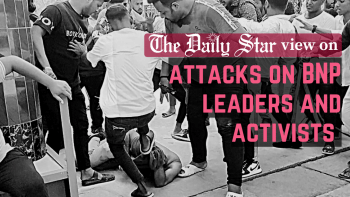BNP’s right to peaceful assembly is inalienable

The contrast between what the government promised opposition political parties and its actions on the ground couldn't be starker, as a rundown on the 22 days of BNP's ongoing countrywide protest programme shows. What the government promised them was – peaceful assembly and freedom of speech. What they are actually having is – violent assembly and fear of speech/reprisals. While this turnabout is politics 101 in Bangladesh, it also begs the question: was the promise of fair play, and the congeniality expressed in the PM's "Will offer BNP leaders tea if they come to besiege my office" comment, at all meant to be taken seriously?
A report by Prothom Alo shows that between August 22 and September 13, violent attacks and clashes were reported in 48 events of BNP organised as part of a countrywide protest programme against the price hikes of fuel and daily essentials and also the deaths of two of its activists in police shooting in Bhola. Multiple people were injured so far, with BNP claiming to have lost three of its activists as of September 4. In 25 places, houses, vehicles and business establishments of its leaders and activists were vandalised, many of them having since left their neighbourhoods in fear of further reprisals. And in 17 places, section 144 was issued because of Awami League events overlapping with BNP's. Finally, 46 cases were filed in 18 districts.
What we're witnessing is downright denial of political space to the opposition camp. It reminds us of the acrimonious circumstances leading up to the controversial 2014 and 2018 elections.
Bizarrely, though, the official line puts the blame for violence on BNP itself, as if the party brought this all on itself in some sick display of self-loathing or to discredit itself. The truth is, it is the police that stands discredited, firstly because of its partisan role in handling the protests, and secondly, because of its heavy-handed and rather collusive legal response. As a breakdown of the 46 clash-related cases illustrates, 29 were filed by the police and 17 by the leaders of Awami League and affiliated organisations, mostly against their rivals in BNP and affiliated organisations. The total number of accused are 21,709. Of them, 2,777 were named and the rest unnamed – a classic formula to allow for more names to be added later. More damningly, however, the abovementioned report says that a number of accused were sick, old or overseas, meaning they were nowhere near the protest sites.
What we're witnessing is downright denial of political space to the opposition camp. It reminds us of the acrimonious circumstances leading up to the controversial 2014 and 2018 elections. This, it goes without saying, is not amenable to creating the level playing field so essential for a fair, safe, and participatory election. As things stand, the ruling camp, despite what it said officially and despite demands by independent parties to protect people's right to peaceful assembly and freedom of expression, appears totally unwilling to allow the opposition to reach the ears of the masses.
This is totally unacceptable. We urge the authorities, including the Election Commission, to ensure the opposition is allowed to protest and prepare for the upcoming election. The ruling party must discipline its activists and the police and keep them from infringing upon these inalienable rights of the opposition.

 For all latest news, follow The Daily Star's Google News channel.
For all latest news, follow The Daily Star's Google News channel. 





Comments